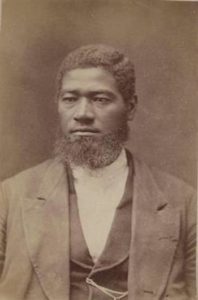
William G. Allen
*The birth of William G. Allen is celebrated on this date in ca. 1820. He was a Black academic, intellectual, and lecturer. William Gustavus Allen was born free in Urbana, Virginia, to a mixed-race mother and a Welsh-American father. He was a Quarteroon.
His birth parents raised Allen in Norfolk, where he attended a school for Black children for two years. The school was closed in response to Nat Turner's slave rebellion in 1831. There was no school for Black children in Fort Monroe, but he received some informal education from Federal soldiers, including some French and German.
A teacher recommended him to Gerrit Smith, whose help, along with that of Lewis Tappan, made it possible for Allen to attend the Oneida Institute. At Oneida, William received ministerial training in Hebrew, Biblical Greek, theology, and philosophy, with small amounts of science, algebra, and public speaking. During the summer of 1841, he "taught in a school for fugitive slaves in Canada. After graduation in 1844, he settled in Troy, New York, and was active in a black suffrage organization.
They edited and published the abolitionist newspaper National Watchman with Henry Highland Garnet. When it ceased publication in 1847, he moved to Boston, studying under and working for the abolitionist lawyer Ellis Gray Loring. In 1850, Allen was appointed professor of Greek and Rhetoric at New York Central College. While visiting Fulton, New York, for a series of lectures in the spring of 1851, Allen spent an evening at the home of the abolitionist Reverend Lyndon King.
Here, Allen met King's daughter, Mary, who was beginning a term at New York Central College. They formed a relationship, and in January 1853, the two became engaged. Her father "at once consented," and her sister "warmly approved." Her brothers and Mary's stepmother were bitterly opposed. Rev. King felt that Allen was from the household, but he still drove Mary to meet Allen's arrival by train. One supportive couple, the Porters, who had also been students at Central College, lived in nearby Phillipsville. While Allen and Mary were visiting, a mob of 600 formed around the Porters' house, seeking to lynch him.
A group within the mob negotiated with Allen, King, and the Porters, hoping to calm the anger. King was escorted to her parents' house. Allen escaped to Syracuse, where he stayed at the Globe Hotel for around a week; Mary took several days to elude her parents and secretly met with Allen at a trusted friend's house. Mary traveled to Pennsylvania, telling her parents she intended to teach school there, and wrote letters to Allen stating she planned to join him. By arrangement, they married in New York City on March 30, 1853, and immediately left for Boston, where they sailed to Liverpool, England, never to return.
The episode was reported in many newspapers, along with derogatory remarks about the pair, especially Allen. He found in England an "absence of prejudice against color. Here the colored man feels among friends, and not among enemies". He and his wife were "happy" there. They traveled across the United Kingdom, moving to Dublin in 1856, where they had four children. In 1860, they moved back to England. He attempted to make a living through his lectures, but the couple was often close to poverty. In 1863, Allen became director of the New Caledonian Trading School in Islington, a school for the poor, the first black person to direct an English school.
However, finances and the "racism of his competitors" forced him out in five years. Mary started a small school for girls, which failed. The relationship between Allen and Mary King was the basis of Louisa May Alcott's 1863 story M.L. In 1871, they were living in Islington with six children. By 1878, they were living in a boarding house in West London, where they survived mainly on the charity of friends. William Allen died at St Mary's Hospital, London, on May 1, 1888.